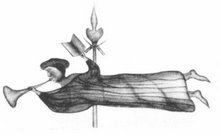Hypocritical svithe
.
Courtesy of Recession Cone, this week's svithe comes from Neal Stephenson's The Diamond Age
- "You know, when I was a young man, hypocrisy was deemed the worst of vices. It was all because of moral relativism. You see, in that sort of a climate, you are not allowed to criticise others - after all, if there is no absolute right and wrong, then what grounds is there for criticism?
"Now, this led to a good deal of general frustration, for people are naturally censorious and love nothing better than to criticise others' shortcomings. And so it was that they seized on hypocrisy and elevated it from a ubiquitous peccadillo into the monarch of all vices. For, you see, even if there is no right and wrong, you can find grounds to criticise another person by contrasting what he has espoused with what he has actually done. In this case, you are not making any judgment whatsoever as to the correctness of his views or the morality of his behaviour - you are merely pointing out that he has said one thing and done another. Virtually all political discourse in the days of my youth was devoted to the ferreting out of hypocrisy.
You wouldn't believe the things they said about the original Victorians. Calling someone a Victorian in those days was almost like calling them a fascist or a Nazi.
"Because they were hypocrites, the Victorians were despised in the late twentieth century. Many of the persons who held such opinions were, of course, guilty of the most nefandous conduct themselves, and yet saw no paradox in holding such views because they were not hypocrites themselves - they took no moral stances and lived by none. So they were morally superior to the Victorians, even though - in fact because they had no morals at all.
"We take a somewhat different view of hypocrisy. In the late-twentiety-century Weltanschauung, a hypocrite was someone who espoused high moral views as part of a planned campaign of deception - he never held these beliefs sincerely and routinely violated them in privacy. Of course, most hypocrites are not like that. Most of the time it's a spirit-is-willing, flesh-is-weak sort of thing.
"That we occasionally violate our own stated moral code, does not imply that we are insincere in espousing that code.
"Of course not. It's perfectly obvious, really. No one ever said that it was easy to hew to a strict code of conduct. Really, the difficulties involved - the missteps we make along the way - are what make it interesting. The internal, and eternal, struggle, between our base impulses and the rigorous demands of our own moral system is quintessentially human. It is how we conduct ourselves in that struggle that determines how we may in time be judged by a higher power."
I hereby resolve to celebrate intended high morality, rather than nitpick the inability to attain it. I think the world would be better if we all did as much.
this svithe on thmusings
last week's svithe



No comments:
Post a Comment